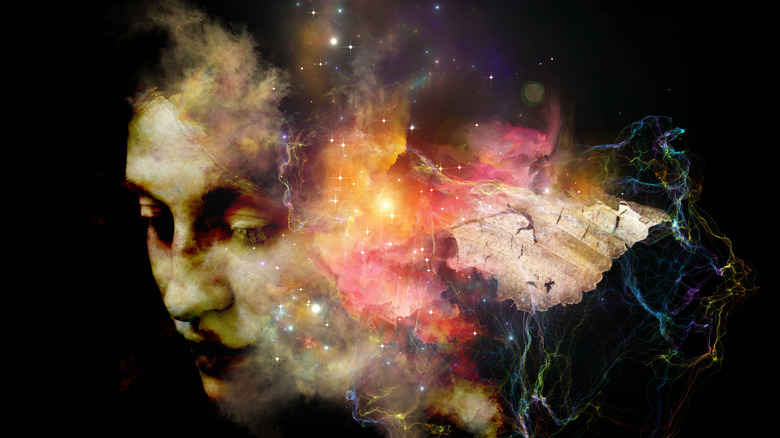Do People Really Have A Soul? Scholars Weigh In
Whether people really have a soul is virtually impossible to prove, though many fervently believe it. The idea that humans have a soul is an integral part of most world religions, and the soul is said to be the part of us that goes on to the afterlife, or that reincarnates, or that gets stuck on Earth in the form of a pesky and mischievous ghost. Essentially, if souls are real, then that means that when our bodies die our consciousness lives on — and for many that's a comforting thought that gives life more meaning.
Beyond belief systems, numerous people around the world have said they have experienced being in soul form, like those who claim to have had near-death experiences (NDEs) in which they claim they were aware of being outside their bodies and often in some other celestial-type place. While many tell stories of feeling unconditional love and reaching new understandings, it's also noteworthy that not all NDEs are good experiences. According to Scientific American, plenty of people report negative NDEs.
Still, these stories aren't easily confirmed in a hard-data kind of way, but they also cannot be ignored because there are just so many of them. Discover Magazine reported that an estimated 9 million people in the U.S. have reported NDEs. Still, some scientists posit that those experiences are not necessarily proof of a soul, but rather some kind of neurological reaction to the trauma happening to the body.
Scholars, of course, do not agree
Neuroscientist Christof Koch is one such scholar of consciousness who contends that the experience of an NDE is likely due to a "biological, not spiritual origin," because, as he wrote in Scientific American, "As a scientist ... I operate under the hypothesis that all our thoughts, memories, percepts and experiences are an ineluctable consequence of the natural causal powers of our brain rather than of any supernatural ones."
But Richard Swinburne, an Oxford philosopher of religion, does think that souls exist. He said on the program "Closer to Truth" (via YouTube) that just looking at the physical part of the world doesn't "tell the whole story of life. You will also have to tell the story of conscious life, which is associated with each body."
Swinburne said the story of life is more than the physical aspects of our being or our measurable experiences, but also includes "separate mental entities for which the natural word is 'soul' ... If you can't bring 'soul' into the account of the world, you will not tell the full story of the world, because you will not tell who has which conscious life."
Swinburne maintains that the soul is the actual essence of who a person is. He said, "souls constitute personal identity and the continued existence of me will consist in the continued existence of my soul."
Consciousness is not fully understood
In a sense, what Swinburne says about souls parallels the opinion of Dr. Robert Lanza, a professor at Wake Forest University. Lanza, who specializes in stem cell research is a "biocentrist," or a scientist who embraces the idea that the universe exists because life exists rather than the long-held notion that life is an offshoot of the universe.
He co-wrote (alongside Robert Lanza) a 2009 article published by NBC News, saying "there is nothing in modern physics that explains how a group of molecules in a brain creates consciousness ... And, what's worse, nothing in science can explain how consciousness arose from matter."
In a 2011 piece he wrote for Psychology Today he describes experiments conducted by physicists in which "the results not only defy our classical intuition but suggest that a part of the mind — the soul — is immortal and exists outside of space and time."
Lanza, like Swinburne, seems to embrace the idea that consciousness is made up of more than science can measure at this point — there is still something intangible that can't be explained about the way our consciousness works. Yet neuroscientist Koch posits that just because we don't understand the brain and consciousness completely, it doesn't mean there is an otherworldly explanation, though he wrote in Scientific American, it is a struggle to "explain the central puzzle of our existence: how a three-pound organ with the consistency of tofu exudes the feeling of life."


